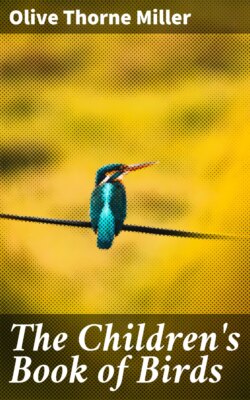Читать книгу The Children's Book of Birds - Olive Thorne Miller - Страница 21
На сайте Литреса книга снята с продажи.
XII
ОглавлениеTable of Contents
WHAT HE EATS
What the bird eats and where he gets his food are useful things for us to know. It has only lately been found out that birds are the most valuable of helpers to us.
What we cannot eat ourselves, they are happy to live on, and things that make us a great deal of trouble are their daily food.
Some of the things they are fond of are little animals, like mice and ground squirrels, that eat our crops. Others are insects which spoil our fruit and eat up our vegetables, cankerworms and cutworms, and a hundred more.
Besides these, many birds eat the seeds of certain weeds that farmers have to fight all the time.
One reason this helps us so greatly is that birds eat much more for their size than we do. A boy of six or eight years could not possibly eat a whole sheep in one day, but a young bird can easily eat more than his own weight every day.
They want more than three meals too. They need to eat very often. One catbird will take thirty grasshoppers for his breakfast, and in a few hours he will want thirty more. So he destroys a great many in a day.
Birds begin eating long before we are out of bed, and keep it up till night comes again, or as long as they can see.
You must not think the birds are greedy, as a person would be if he ate every few minutes all day. They are made to do so. It is their business to destroy insects, small animals, and weeds that trouble us so much, and the more they eat the better for us.
Let us see where they go for food. Each bird has his own place to work.
The catbird watches the fruit-trees, and all day long eats insects that are spoiling our fruit or killing the trees. When the cherries are ripe, we should not forget that he has saved the fruit from insects, and has well earned a share for himself.
If you spent days and weeks picking off insects, would you not think you had earned part of the fruit? "For every cherry he eats" (says a man who has watched him), "he has eaten at least one thousand insects."
The robin eats great numbers of cankerworms, which destroy our apples, and cutworms, which kill the corn.
The bluebird sits on the fence keeping sharp watch, and every few minutes flies down and picks up a grasshopper or a cricket, or some such grass-eating insect.
Woodpeckers hunt over the trunks and limbs of trees. They tap on the bark and listen, and if they hear a grub stir inside, they cut a hole in the bark and drag it out. The downy is fond of insects that infest our apple-trees, and he makes many holes in the trunks. But it does not hurt the trees. It is good for them, for it takes away the creatures that were eating them.
Orioles go over the fruit-trees, and pick out tiny insects under the leaves, and when they find great nests on the branches, they tear them open and kill the caterpillars that made them.
Little warblers, such as the pretty summer yellow-bird, help to keep our trees clear, doing most of their work in the tops, where we can hardly see them.
Swallows fly about in the air, catching mosquitoes and tiny flies that trouble us.
Very useful to us are the birds who feed upon dead animals, such as the turkey buzzards, who may be seen any day in our Southern States, soaring about high in the air, looking for their food.
What they eat is so very unpleasant to us that we are apt to despise the birds. But we should cherish and feel grateful to them instead. For they are doing us the greatest kindness. In many of the hot countries people could not live, if these most useful birds were killed.
Some persons think buzzards find their food by seeing it, and others are just as sure that they smell it. Perhaps they use both senses.
